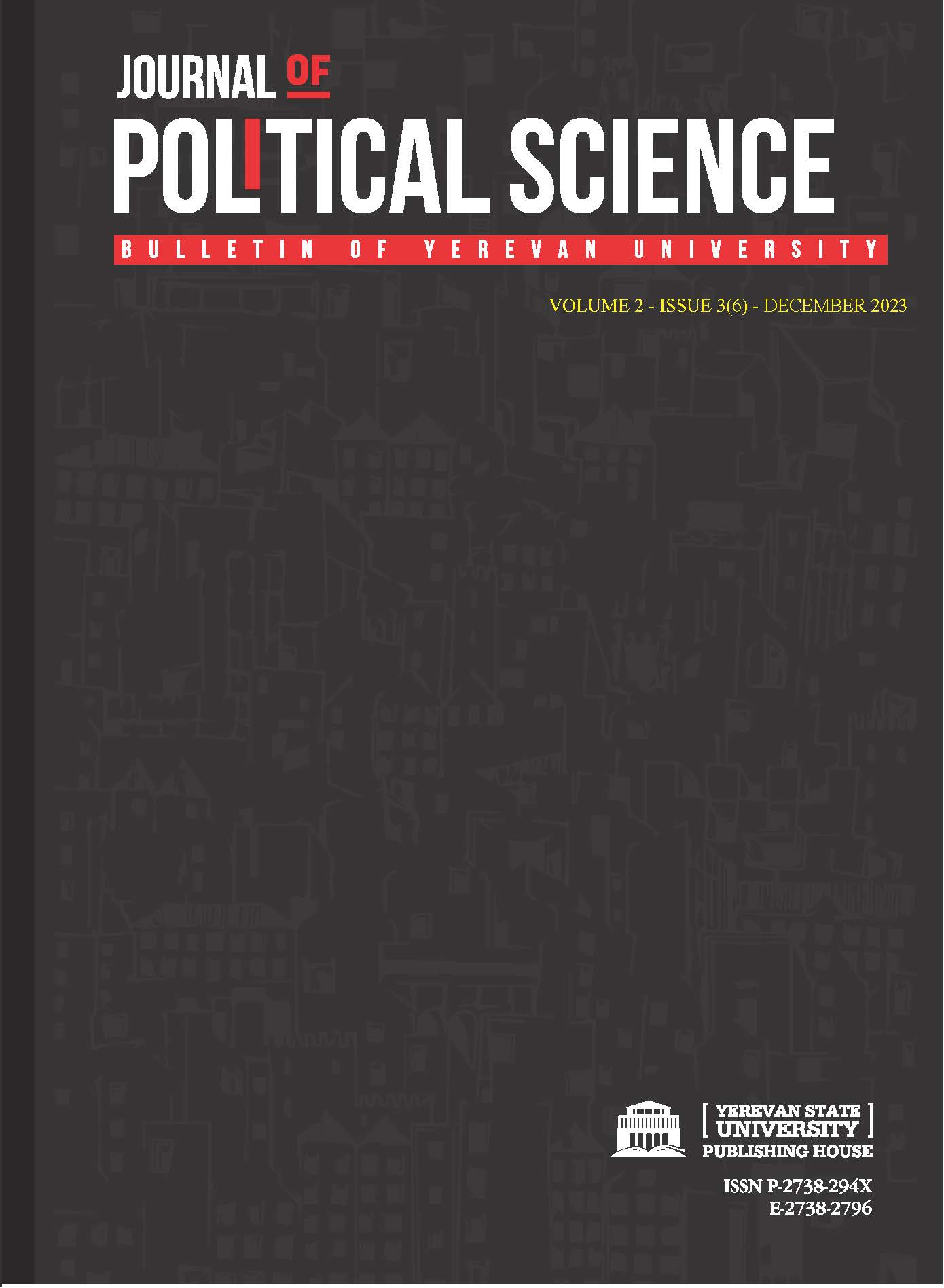South Caucasus in the Phase of Russian-Ukrainian War: New Security Challenges and Possible Scenarios for Development
DOI:
https://doi.org/10.46991/JOPS/2023.2.6.032Keywords:
Russian-Ukrainian conflict, South Caucasus, Armenia, Georgia, Azerbaijan, security systems, Nagorno-Karabakh conflict, energy diplomacy, European integration, Belt and Road InitiativeAbstract
The paper mainly examines the economic, political and military situation in the South Caucasus after the start of Russian-Ukrainian war. In the paper we are focused on the question of what kind of consequences does the Russian-Ukrainian war has on the countries of the South Caucasus. Relying on the analytical-forecasting approach, we also are trying to forecast what developments can be expected in this region. On this regard we especially look onto the facts from Armenia’s perspective. Of course, the discussion of the situation in Georgia and Azerbaijan was also under our great attention, because we also had set a task to compare the processes that took place in the three countries of the region.
The modernity of the topic can be measured, first of all, by its global political significance: Russian-Ukrainian conflict continues to be on the top of world political processes. On the other hand, it is actual when studying political and economic processes in the post-Soviet territory. By and large, as a result, the South Caucasus is a part of the European and Middle Eastern security sphere, or at least has an important role in them. Therefore, the ongoing developments in this region are not local and may also affect the European, Middle Eastern and the processes also in other regions.
Russian-Ukrainian conflict has affected on foreign policy behavior of the Southern Caucasus countries. The region is now under the turbulence zone, so we are not aware from being faced by new challenges and security issues. Since we have highly evaluated the impact of the conflict on the countries of the region, we have also tried to make certain predictions regarding possible future development scenarios, which could be as recommendations for foreign policy decision making structures of Armenia.
References
Ali, Toghruli 2023. “Elevating Azerbaijan-Ukraine Strategic Partnership: Mine Clearing Unveils New Dimensions.” Washington DC: Caspian Policy Center.
Avdaliani, Emil. 2022a. Turkey’s Evolving Approach to the Black Sea and the South Caucasus Region. In: New World Order and Small Regions. Palgrave Macmillan, Singapore, 87-127. https://doi.org/10.1007/978-981-19-4037-8_4.
Avdaliani, Emil. 2022b. “Russia’s “Return” to the South Caucasus. In: New World Order and Small Regions. Palgrave Macmillan, Singapore, 191-224. https://doi.org/10.1007/978-981-19-4037-8_7.
Avdaliani, Emil. 2023a. “Carnegie EIP. Playing With Fire: Georgia’s Cautious Rapprochement with Russia.” Washington, DC: Carnegie Endowment for International Peace.
Avdaliani, Emil. 2023b. “Playing With Fire: Georgia’s Cautious Rapprochement with Russia. Carnegie EIP.” Carnegie Endowment for International Peace, July 21, 2023. Accessed 20 September 2023. https://carnegieendowment.org/politika/90246.
Baev, Pavel K. 2023. The next surge of conflict in the South Caucasus is still preventable. L’Ifri Report, October 2023. Accessed 20 November 2023. https://www.ifri.org/sites/default/files/atoms/files/baev_conflict_south_caucasus_2023.pdf.
Charap, Samuel, and Miranda Priebe. 2023. “Avoiding a Long War: U.S. Policy and the Trajectory of the Russia-Ukraine Conflict.” Santa Monica, CA: RAND Corporation. Accessed 20 September 2023. https://www.rand.org/pubs/perspectives/PEA2510-1.html.
Deen, Bob, Wouter Zweers, and Camille Linder. 2023. “The EU in the South Caucasus: Navigating a geopolitical labyrinth in turmoil.” Clingendael Report (March). Accessed 20 September 2023. https://www.clingendael.org/sites/default/files/2023-03/the-eu-in-the-south-caucasus.pdf.
Galitsky, Alex. 2022. “Foreign Policy. Azerbaijan’s Aggression Has Forced Armenia into Russia’s Arms.” October 24, 2022. Accessed 20 September 2023. https://foreignpolicy.com/2022/10/04/azerbaijan-aggression-armenia-russia-nagorno-karabakh/.
Isayev, Heydar, and Joshua Kucera. 2022. “Ahead of Ukraine invasion, Azerbaijan and Russia cement “alliance”.” Eurasianet, February 24, 2022. Accessed 20 September 2023. https://eurasianet.org/ahead-of-ukraine-invasion-azerbaijan-and-russia-cement-alliance
Kibak, Quil, Ryan Kirkpatrick, William O’Neil, and Daniel O’Neill. 2023. “Russian Malign Influence in Eastern Europe and the South Caucasus: Recommendations for U.S. Government Strategy in the Post-Ukraine Invasion Context. University of Maine.” Accessed 20 September 2023. https://spia.umaine.edu/wp-content/uploads/sites/39/2023/05/SPI-578-Final-Report-2.pdf.
Krawatzek, Félix, Isabelle DeSisto, and George Soroka. 2023. “Russians in the South Caucasus: Political Attitudes and the war in Ukraine.” ZOIS Report 2, May 3, 2023. Accessed 20 September 2023. https://www.zois-berlin.de/en/publications/zois-report/russians-in-the-south-caucasus-political-attitudes-and-the-war-in-ukraine.
Krivosheev, Kirill. 2023. “Carnegie Endowment for International Peace. Could the New EU Mission Sideline Russia in Armenia-Azerbaijan Settlement?” February 16, 2023. Accessed 25 May 2023. https://carnegieendowment.org/politika/89060.
Lebow, Richard Ned. 2022. “International Relations Theory and the Ukrainian War.” Analyse & Kritik 44 (1): 111-135.
Meister, Stefan. 2023a. “Introduction by Special Editor: Russia’s War against Ukraine: Connectivity and Disruption in the South Caucasus.” Caucasus Analytical Digest 132 (March).
Meister, Stefan. 2023b. “Geopolitics of Infrastructure and Connectivity in the South Caucasus: The Case of Armenia and Azerbaijan.” Caucasus Analytical Digest 132 (March): 21-25. https://doi.org/10.3929/ethz-b-000613995.
Mghdesyan, Arshaluis. 2023. “Russia’s powerful economic levers over Armenia.” Eurasianet, November 1, 2023. Accessed 20 November 2023. https://eurasianet.org/russias-powerful-economic-levers-over-armenia
Minassian, Gaidz. 2022. “How the War in Ukraine Intersects With the South Caucasus, Part I: The Stakes of a New Bipolarity.” EVN Report. December 12, 2022. Accessed 20 September 2023. https://evnreport.com/opinion/how-the-war-in-ukraine-intersects-with-the-south-caucasus-part-i/.
Neset, Siri et al. 2023. “Changing Geopolitics of the South Caucasus after the Second Karabakh War: Prospect for Regional Cooperation and/or Rivalry.” CMI Report 4 (September). Bergen, Norway: Chr. Michelsen Institute.
O’Byrne, David. 2022. “Eurasianet. Azerbaijan’s Russian gas deal raises uncomfortable questions for Europe.” November 22, 2022. Accessed 10 June 2023. https://eurasianet.org/azerbaijans-russian-gas-deal-raises-uncomfortable-questions-for-europe.
Souleimanov, Emil, and Yury Fedorov. 2023. “The War in Ukraine: Risks and Opportunities For the ‘Post-Soviet South’.” Middle East Policy, August 21, 2023. Accessed September 20, 2023. https://onlinelibrary.wiley.com/doi/epdf/10.1111/mepo.12709.
Toroyan, Hayk. 2023. “Circumventing Russia: Can the South Caucasus connect the West to the East?” Friedrich Naumann Faundation, March 21, 2023. Accessed September 20, 2023. https://www.freiheit.org/germany/circumventing-russia-can-south-caucasus-connect-west-east.
Walker, Nigel. 2023. “Conflict in Ukraine: A timeline (2014 - eve of 2022 invasion).” House of Common library: Research Briefing, August 22, 2023. Accessed September 20, 2023. https://researchbriefings.files.parliament.uk/documents/CBP-9476/CBP-9476.pdf.
Downloads
Published
Issue
Section
License
Copyright (c) 2023 Roman Karapetyan

This work is licensed under a Creative Commons Attribution-NonCommercial-ShareAlike 4.0 International License.



